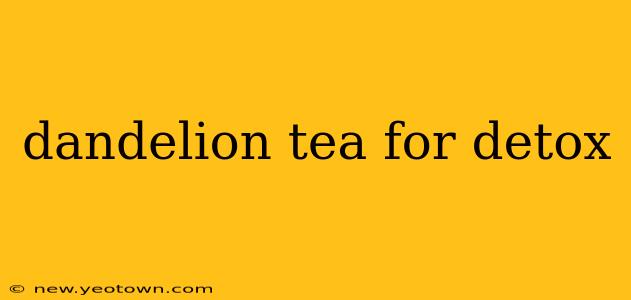Spring has sprung, and with it comes the urge to shed the winter layers—both physically and metaphorically. Many turn to detoxifying practices, and dandelion tea has emerged as a popular choice. But does this humble weed truly live up to its detoxifying reputation? Let's delve into the world of dandelion tea and explore its purported benefits, backed by science and seasoned with a touch of folklore.
Our journey begins, not in a lab coat, but in a sun-drenched meadow. Imagine yourself, cup in hand, inhaling the earthy aroma of freshly brewed dandelion tea. The golden liquid, a vibrant reflection of the sunny blooms, promises a cleansing experience. But is it just a placebo effect, or is there genuine science behind this springtime ritual?
What are the purported health benefits of dandelion tea?
Dandelion, far from being a mere weed, is a powerhouse of nutrients. Its leaves and roots are packed with vitamins A, C, and K, as well as potassium and antioxidants. These nutrients contribute to its potential health benefits, fueling the belief that it aids in detoxification. But let's dissect this claim carefully. "Detox" is often a misleading term in the health world; our bodies have natural detoxification processes. Dandelion tea isn't a miracle cure, but it can support these natural processes in several ways:
Does dandelion tea help with liver function?
This is arguably the most common claim surrounding dandelion tea's detoxifying properties. Studies suggest that dandelion may help support liver function by stimulating bile production. Bile is crucial for breaking down fats and eliminating toxins from the body. While more research is needed to definitively confirm these benefits in humans, the preliminary findings are encouraging.
Can dandelion tea help with digestion?
Dandelion's high fiber content can aid in digestion. Fiber adds bulk to the stool, promoting regularity and preventing constipation. A healthy digestive system is essential for efficient waste elimination, which contributes to the overall feeling of being "detoxified."
Is dandelion tea a good source of antioxidants?
Absolutely! Dandelion is brimming with antioxidants, which combat free radicals—unstable molecules that can damage cells and contribute to various health problems. These antioxidants help protect your body from oxidative stress, contributing to overall health and well-being.
How to make dandelion tea?
Making dandelion tea is surprisingly simple. You can either forage your own dandelions (ensure they're free from pesticides and herbicides) or purchase dried dandelion root or leaves from a reputable source. For a simple infusion:
- Steep: Add 1-2 teaspoons of dried dandelion root or leaves to a cup of hot (not boiling) water.
- Brew: Let it steep for 5-10 minutes.
- Strain: Remove the leaves or roots using a strainer.
- Enjoy: Sip your golden elixir, possibly with a touch of honey or lemon to enhance the flavor.
What are the potential side effects of dandelion tea?
While generally safe for consumption, dandelion tea can cause some side effects in certain individuals:
Can dandelion tea cause allergic reactions?
Yes, some people are allergic to dandelions and may experience skin rashes, itching, or swelling after consumption. If you have a known allergy to ragweed or other plants in the Asteraceae family, exercise caution.
Can dandelion tea interact with medications?
Dandelion can interact with certain medications, particularly diuretics and blood thinners. Consult your doctor before consuming dandelion tea if you're on any medication.
Is dandelion tea good for weight loss?
While dandelion tea may indirectly support weight loss by aiding digestion and boosting metabolism, it's not a magic weight-loss solution. A balanced diet and regular exercise remain crucial for achieving sustainable weight loss.
Is dandelion tea a natural diuretic?
Yes, dandelion acts as a mild diuretic, meaning it can increase urine production. This can help flush out excess water and sodium from the body, contributing to the feeling of detoxification. However, excessive consumption might lead to dehydration, so moderation is key.
In conclusion, while the term "detox" often carries exaggerated promises, dandelion tea offers genuine potential benefits. Its nutrient-rich profile supports various bodily functions, including liver health and digestion. However, it's not a miracle cure, and individual reactions can vary. Always consult with your healthcare provider before incorporating dandelion tea, or any new herbal remedy, into your routine, especially if you have pre-existing health conditions or are taking medications. Remember to enjoy your cup of dandelion tea mindfully, appreciating its natural goodness as part of a holistic approach to well-being.

